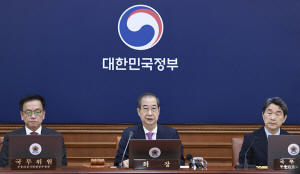South Korea will hold a presidential election June 3 to choose Yoon's
successor
[April 08, 2025]
By HYUNG-JIN KIM
SEOUL, South Korea (AP) — South Korea will hold a snap presidential
election June 3 to choose Yoon Suk Yeol's successor after the
conservative was ousted over his imposition of martial law late last
year.
The announcement from acting President Han Duck-soo came four days after
the Constitutional Court unanimously removed Yoon from office, which by
law, must be followed by an election within 60 days. The next president
will serve a full 5-year term.
Deep political polarization will likely shape the election into a
two-way showdown between Yoon’s People Power Party and its chief liberal
rival, the Democratic Party, which holds a majority in the National
Assembly.
It will be an uphill battle for the People Power Party as it struggles
to restore public confidence and heal severe internal divisions left by
Yoon’s brief enactment of martial law.
The focus of attention is on whether conservatives can regroup and field
a strong candidate to compete against likely Democratic Party candidate
Lee Jae-myung, who observers say is the clear front-runner.
Potential candidates
South Korea's political parties are expected to launch primaries to
select their presidential candidates in the coming weeks.
The Democratic Party candidate is expected to be Lee, a powerful party
leader who faces no major challengers inside the party. Lee, who
narrowly lost the 2022 election to Yoon, led the party through a crisis
during which many of its members faced off against troops sent by Yoon
to encircle the National Assembly building, voted down martial law and
later impeached Yoon.
About 10 politicians from the People Power Party are expected to seek
the nomination.

Conservatives in disarray
Yoon’s baffling decision to enact martial law, which brought armed
troops into Seoul’s streets and evoked the country’s traumatic memories
of past military rule, was a blow to his party’s reputation even though
the party wasn’t directly involved.
Some reformist party members openly criticized Yoon’s actions and cast
ballots to impeach him, triggering a feud with the party’s old guard who
supported the president.
Yoon has diehard supporters who regularly staged massive rallies. Many
share an unfounded perception that Yoon is a victim of a leftist, North
Korea-sympathizing opposition that has rigged elections to gain a
legislative majority and plotted to remove a patriotic leader.
“South Korea’s conservative party faces significant disadvantages
heading into the upcoming election. Two months is a short time to unify
the base, moderates and a conspiracy-driven fringe around a single
candidate,” said Leif-Eric Easley, a professor at Ewha University in
Seoul.
[to top of second column]
|

South Korean acting President Han Duck-soo, center, speaks during a
Cabinet meeting at the government complex in Seoul, South Korea,
Tuesday, April 8, 2025. (Hong Hae-in/Yonhap via AP)

The party’s current leadership is filled with Yoon loyalists, and that
will likely let the internal divide continue and undermine its electoral
prospects, said Choi Jin, director of the Seoul-based Institute of
Presidential Leadership.
Among the leading People Power Party presidential hopefuls, Labor
Minister Kim Moon Soo is considered to be the most pro-Yoon. He and
Daegu Mayor Hong Joon-pyo opposed impeaching Yoon, while former party
leader Han Dong-hoon and senior party lawmaker Ahn Cheol-soo supported
removing him from office. The last major candidate is Seoul Mayor Oh Se-hoon,
who has maintained an ambiguous position.
Choi said Yoon will likely exert his influence to boost pro-Yoon figures
who are seeking the nomination and party leadership posts so they can
defend him as he faces a criminal trial. Yoon was charged with rebellion
in January, and he could face other charges like abuse of power now that
he has lost presidential immunity, which protected him from most
criminal prosecutions.
The People Power Party “will need to nominate someone who can win over
the public, particularly the moderates, rather than someone who can win
the party’s primaries,” said Duyeon Kim, a senior analyst at the Center
for a New American Security in Washington. “Korean moderates and the
young generation in their 20s and 30s will likely be the swing voters.”
Lee’s bid
Opposition leader Lee, who has served as a provincial governor and a
city mayor, is considered by his supporters as a populist reformer. But
critics regard him as a demagogue who relies on stoking divisions and
demonizing his rivals.
Lee faces five ongoing trials for corruption and other criminal charges.
If he becomes president, those trials will likely stop thanks to
presidential immunity.
Yoon has repeatedly accused Lee’s Democratic Party of abusing its
parliamentary majority status to obstruct his agenda, impeach senior
officials and slash the government’s budget bill. Yoon said his martial
law declaration was a desperate attempt to draw public support of his
fight against “wickedness” of Lee’s party.
“Lee Jae-myung has many detractors among the South Korean public who
believe he nearly broke the government for his own benefit, weaponizing
the legislature to push Yoon over the edge and cast his own legal cases
as political persecution,” Easley said.
“Lee’s successful maneuvering, including the purge of progressive
politicians disloyal to him, means he effectively owns the Democratic
Party nomination and has the clearest path to the presidency,” he said.
All contents © copyright 2025 Associated Press. All rights reserved |